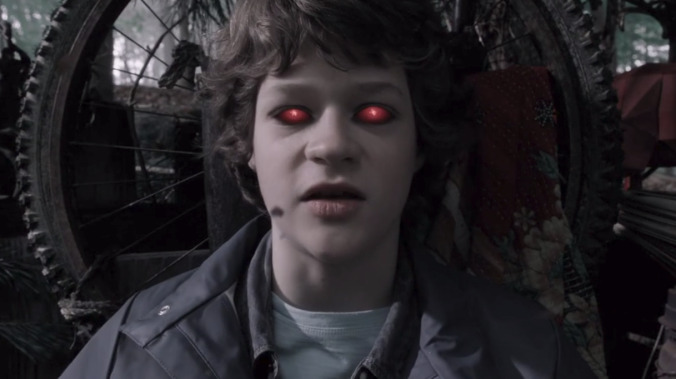Good Omens briefly turns into Brightburn, for some God-forsaken reason


We need to talk about Adam.
If there’s one problem with Terry Pratchett and Neil Gaiman’s really-quite-lovely 1990 novel Good Omens, it’s that it frequently reads like exactly what it is: a shaggy series of funny, loosely connected comic vignettes, sent back and forth between two authors in as much of an effort to make each other laugh as to tell a coherent story. But if there are two problems, the second has got to be that whatever story the book does have centers its biggest emotional moments in the head of its most inscrutable character: Potential Antichrist Adam Young. As a sort of overly-sincere parody of British kid-ness, Adam is a hard read even before he starts hearing voices that tell him to end the world in apocalyptic flames. Afterwards, he becomes little more than a cipher for the final hundred or so pages of the book.
You’d think a six-hour TV adaptation could do more to flesh out its most (plot-) important character. But what with the sheer number of moving pieces currently in play, the weird little digressions this show so loves detouring down, and the hard-to-ignore fact that there are just more interesting characters out there that we could be spending our time with, it doesn’t feel like “The Doomsday Option” gets more than an inch or two into Adam’s head before the big pivot in his character arrives. Adam’s rejection of his “destiny” should be the biggest emotional moment of not just this episode, but also the entire series, the moment when he picks humanity and Tadfield over dominion over all the Earth. Instead, it comes off looking like he’s throwing a tantrum because everyone thought his Brightburn cosplay looked really dumb. (It really, really does; whoever thought they could get away with those red-eye effects on Sam Taylor Buck needs to have their decision-making license revoked.)
Instead, “Doomsday” draws its biggest emotional punch—as usual—from David Tennant, who doesn’t shy away from Crowley’s heartbreak when he realizes that something terrible has probably happened to his best friend. Tennant is equally magnetic when tapping into the demon’s manic side, too; his final confrontation with Hastur in the flaming wreckage of his beloved Bentley transcends “trying to be cool” and manages to achieve the genuine article. Meanwhile, we finally get some justification for why comic legend Miranda Richardson was cast in the until-now tertiary role of Shadwell’s neighbor, Madame Tracy. Channeling Aziraphale, she gives a spirited—sorry, sorry—double performance, tossing herself around the room, bickering with herself, and just generally managing to out-yell Michael McKean for the first time in the entire series. Her endlessly expressive hands when Aziraphale takes charge of their shared body is a nice little touch, and her convulsions during the hijacked seance sequence achieve some semblance of actual spooky.
Speaking of which: This is probably about as good as the four horsemen (or, rather, the four incredibly trashy-looking bikers) of the apocalypse are going to get, and it’s a minor triumph for the make-up team, if nothing else. These characters work better as bestial forces than the “prosaic co-workers” schtick the show occasionally drifts toward anyway. And if their ultimate plan feels like a bit of an anti-climax, it is, at least, a very deliberate one, hijacking powerful computer systems instead of leading armies directly toward the plains of blood.
“The Doomsday Option” ends on a surprisingly abrupt note, as if to say, “Oh, thank god, we got all of these fucking characters within a hundred feet of each other for the finale. Let’s go get a drink.” It’s an entire episode about people traveling to the place where the actual exciting things are set to happen, and while there’s a lot of conventional wisdom about the journey being more important than the destination, it doesn’t necessarily play out in full when considered here. There are joys—Good Omens has never been without joys, whether it’s seeing a room full of telemarketers get devoured by maggots, or watching Fleabag’s Bill Paterson attempt to process the sight of Crowley’s eternally flaming car—but it also rests too much of its impact on an emotional turn that just never seemed to make it into the show proper. Adam Young is a good guy now, which is probably for the best, continued-existence-of-humanity-wise. It just would have been nice to see that particular journey end up on the screen.
Stray Observations
- For the sake of completeness: Anathema and Newt are also there.
- This seems as good a place as any to put this: I don’t think the Queen needle drops that pop up throughout the series work, mostly because they’re too damn on the nose. There’s something ironic in the fact that the whole Queen runner in the book comes from the fact that the band’s greatest hits collections are overwhelmingly ubiquitous, only for them to crop up four, five times an episode in the show.
- Shadwell treating his finger like a loaded weapon throughout the episode (including pushing the buzzer with his elbow) is a nice bit of business. As was his bewildered discovery of Tracy’s bright pink flogger.
- Another good Tennant bit: Ranting about the utter, dull loathsomeness of the 14th century.
- This is the episode where both Pratchett and Gaiman get namechecks, apparently; I’m especially partial to Pratchett’s, especially because the Death of Good Omens is very similar to the one from his beloved Discworld books.
- Speaking of: Death really does feel the hardest done-by by this adaptation. That bike is hideous, but at least he gets to make it clear he serves neither Heaven nor Hell, which is an important distinction that feels like it was being glossed over.
- The scene between Crowley and Aziraphale’s spirit is sweet, but it reads like they weren’t filming in the same room together (probably because they weren’t.). Highlights how much Sheen and Tennant’s chemistry elevates their scenes.
- Given how slavishly this show adapts almost every throwaway bit from the book, it’s actually kind of amazing that Gaiman skipped over the bit where a quartet of bikers decide to follow the horseman, dubbing themselves “Grievous Bodily Harm,” “Cruelty To Animals,” “Really Cool People,” and “Embarrassing Personal Problems” (among others).
- I’ll confess: The pause to activate the turn signal on the flying, angel-powered scooter made me laugh.
- Ineffable count: I-nothing-able. (Sorry, again.)
